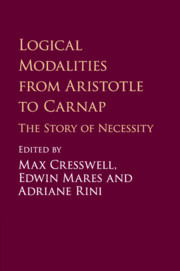Book contents
- Frontmatter
- Contents
- List of Figures and Tables
- List of Contributors
- List of Abbreviations
- Introduction
- 1 Aristotle on the Necessity of the Consequence
- 2 Aristotle on One- Sided Possibility
- 3 Why Does Aristotle Need a Modal Syllogistic?
- 4 Necessity, Possibility, and Determinism in Stoic Thought
- 5 Necessity in Avicenna and the Arabic Tradition
- 6 Modality without the Prior Analytics: Early Twelfth Century Accounts of Modal Propositions
- 7 Ockham and the Foundations of Modality in the Fourteenth Century
- 8 Theological and Scientific Applications of the Notion of Necessity in the Mediaeval and Early Modern Periods
- 9 Locke and the Problem of Necessity in Early Modern Philosophy
- 10 Leibniz's Theories of Necessity
- 11 Leibniz and the Lucky Proof
- 12 Divine Necessity and Kant's Modal Categories
- 13 Charles Sanders Peirce on Necessity
- 14 The Development of C. I. Lewis's Philosophy of Modal Logic
- 15 Carnap's Modal Predicate Logic
- Bibliography
- Index
11 - Leibniz and the Lucky Proof
Published online by Cambridge University Press: 05 September 2016
- Frontmatter
- Contents
- List of Figures and Tables
- List of Contributors
- List of Abbreviations
- Introduction
- 1 Aristotle on the Necessity of the Consequence
- 2 Aristotle on One- Sided Possibility
- 3 Why Does Aristotle Need a Modal Syllogistic?
- 4 Necessity, Possibility, and Determinism in Stoic Thought
- 5 Necessity in Avicenna and the Arabic Tradition
- 6 Modality without the Prior Analytics: Early Twelfth Century Accounts of Modal Propositions
- 7 Ockham and the Foundations of Modality in the Fourteenth Century
- 8 Theological and Scientific Applications of the Notion of Necessity in the Mediaeval and Early Modern Periods
- 9 Locke and the Problem of Necessity in Early Modern Philosophy
- 10 Leibniz's Theories of Necessity
- 11 Leibniz and the Lucky Proof
- 12 Divine Necessity and Kant's Modal Categories
- 13 Charles Sanders Peirce on Necessity
- 14 The Development of C. I. Lewis's Philosophy of Modal Logic
- 15 Carnap's Modal Predicate Logic
- Bibliography
- Index
Summary
There are a number of different strands to Leibniz's thinking about necessity. From as early as the compatibilist determinism of the Letter to Magnus Wedderkopf in 1671, which is the setting for all his subsequent thinking about contingency and necessity, to the Theodicy of 1710, and beyond, the strands are twisted together in various different ways. Leibniz begins as a determinist, and then has to consider how contingency and freedom fit in. Among the elements in his thinking about the analysis of modality are the following:
(i) The impossible is or is on analysis the contradictory and the possible is what is or is on analysis the consistent.
(ii) The necessary is what is essential to a thing, or possible consistently with its own nature, if it exists at all, as in a definition, and the possible and contingent is what actually exists, if it is created, except God, whose essence is existence.
(iii) The necessary is what is real, though incompletely or not determinately described, such as an abstract plane rather than a real tabletop.
(iv) The necessary is what is internal to a thing, derived from its cause, when it comes into existence, and the contingent is what is external to it.
(v) The necessary is what obtains in all possible worlds, and the merely possible is what obtains only in some.
(vi) A necessary truth can be finitely analyzed, whereas a contingent truth is a truth whose analysis is infinite, in the sense that it “contains” an infinitely long list of predicate terms. This list converges asymptotically on the complete individual concept associated with the subject term, the truth known by God in a single apprehension. We beings with finite minds can know necessary truths by analysis, since the list of their predicate terms is finite in number, but we can only know or “prove” contingent truths a posteriori. The contingent truths do allow an a priori proof, but it is not one that is available to us.
(vii) The necessary truth is the eternal truth in the mind of God.
I am very uneasy about thinking that these elements or groups of elements form different, complete, and incompatible theories of contingency and necessity in Leibniz's mind, as Robert Adams has suggested.
- Type
- Chapter
- Information
- Logical Modalities from Aristotle to CarnapThe Story of Necessity, pp. 218 - 231Publisher: Cambridge University PressPrint publication year: 2016

